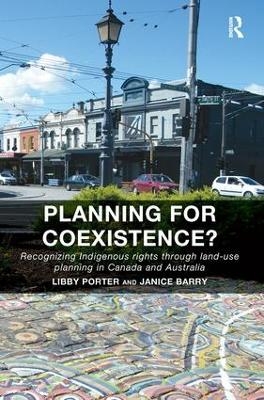
Planning for Coexistence?
Routledge (Verlag)
978-1-138-49040-6 (ISBN)
Libby Porter is Associate Professor at the Centre for Urban Research, at RMIT University (Melbourne, Australia). Her research is about the complicity of planning in dispossession and displacement, especially of Indigenous peoples in settler-colonial states, and also of disadvantaged communities through urban regeneration policies and mega-events. Janice Barry is an Assistant Professor in the Department of City Planning at the University of Manitoba (Winnipeg, Canada). Her research explores the tensions between more collaborative forms of land use decision-making and larger institutional structures and discourses, and Indigenous peoples' experiences of state-directed planning. She also coordinates a service-based learning partnership with several Manitoba First Nations.
1. Introduction: The Challenge of Indigenous Coexistence for Planning, Part I Concepts and Contexts, 2. ‘We Are All Here to Stay’: A ‘Meditation on Discomfort’, 3. Seeing the Contact Zone: A Methodology for Analyzing Links between Everyday and Textual Practice, 4. Constructing Contact Zones: Planning and Recognition Discourses in Victoria and British Columbia, Part II Stories of Planning in (Post) Colonial Victoria and British Columbia, 5. The Non-Recognition of Indigenous Rights in Metropolitan Melbourne, 6. Negotiating Bounded Recognition: Seeking Co-management on the River Red Gum Flood Plains, 7. Neighbour-to-Neighbour Planning Relations along Vancouver’s North Shore, 8. Planning for Wilp Sustainability in the Nass and Skeena River Watersheds, Part III Conceptualizing Coexistence in Planning Theory and Practice, 9. Negotiating, Contesting, Reframing: Indigenous Agency in the Contact Zone, 10. Bounded Recognition: How Planning Resettles Indigenous Claims, 11. Developing Intercultural Capacity: Lessons for Planning Practice, 12. Towards Coexistence: Rethinking Planning for Indigenous Justice
| Erscheinungsdatum | 04.03.2018 |
|---|---|
| Zusatzinfo | 1 Tables, black and white; 8 Line drawings, black and white; 5 Halftones, black and white |
| Verlagsort | London |
| Sprache | englisch |
| Maße | 156 x 234 mm |
| Gewicht | 362 g |
| Themenwelt | Naturwissenschaften ► Biologie ► Ökologie / Naturschutz |
| Naturwissenschaften ► Geowissenschaften ► Geografie / Kartografie | |
| Sozialwissenschaften ► Soziologie ► Spezielle Soziologien | |
| Technik ► Elektrotechnik / Energietechnik | |
| Technik ► Umwelttechnik / Biotechnologie | |
| ISBN-10 | 1-138-49040-7 / 1138490407 |
| ISBN-13 | 978-1-138-49040-6 / 9781138490406 |
| Zustand | Neuware |
| Haben Sie eine Frage zum Produkt? |
aus dem Bereich


